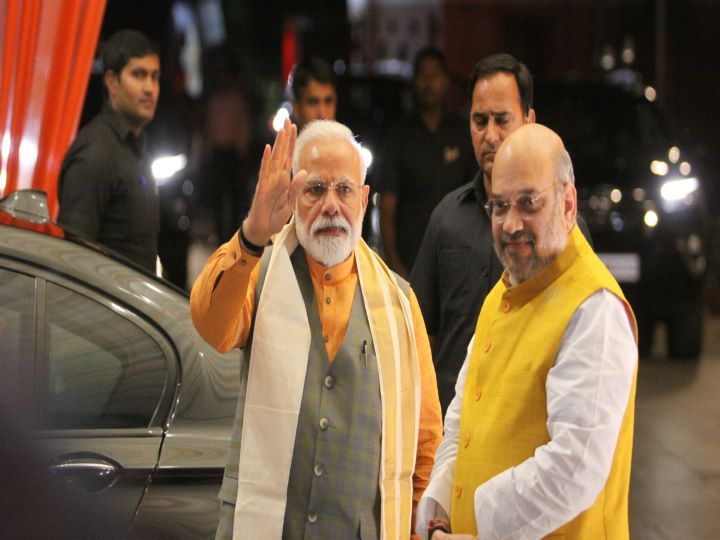Modi 2.0 Anniversary: The Crisis Managers In The BJP-Led NDA Government
While PM Modi, himself is skilled in handling every crisis, the decision of abrogation of Article 370, SC's decision on Ayodhya, and the Coronavirus pandemic introduced us to the crisis managers of the Modi 2.0 government.
by Aastha Raj
New Delhi: The Narendra Modi led NDA will complete the first year of the Modi 2.0 government on 31st May, 2020 and the first year of the government was filled with historic decisions that will be remembered by generations. Though the government took some important decisions, there were times when those decisions brought the government in a tight spot. It is interesting to know about those who made it easier for the government by dousing the fire as it started. Who were the real crisis managers in the first year of Modi 2.0?
Home Minister Amit Shah
After taking oath as the Home Minister in the Modi 2.0 government it has been the rise and rise of Amit Shah. BJP won by a huge mandate in May 2019 Lok Sabha elections, needless to say, the victory was inevitable. Shah was lauded for leading BJP as they made a clean a swipe towards victory. India's second most powerful leader Amit Anil Chandra Shah has been the nucleus for all the major decisions that the government has announced since taking to power for the second time.
Just over 2 months of taking charge, Union Home Minister Amit Shah announced the abrogation of Article 370 which led to a huge ruckus in both houses of the parliament. The opposition continuously criticized the move but it was Amit Shah's floor management which aggressively dealt with every question that resulted in passing the order in both the houses.
Scrapping Article 370 was a bold move that could have created a massive turmoil in Jammu and Kashmir but Amit Shah's decisions made sure that law and order prevailed in the territory.
Another remarkable crisis management by Amit Shah was during the Ayodhya verdict. The honorable Supreme Court announced the verdict for the Ram Janmabhoomi-Babri Masjid land dispute case on 9th November 2019. It was seen as the BJP meeting one of its key manifesto promises.
But, this historic decision could have provoked religious riots disturbing the law and order of the country, especially in Uttar Pradesh. It was Amit Shah who took firm control of the security establishment, along with the Yogi government which helped in maintaining peace after SC announced the decision of a 70 year-long battle in favor of Ram Mandir.
Also read| Modi 2.0 Anniversary | Landmark Decisions In Defence: From Appointment Of India's First CDS To FDI Limit Hike In Defence Manufacturing
External Affairs Minister Subrahmanyam Jaishankar
PM Modi delivered a grand welcome to the world's most powerful and disputed leader in Ahmedabad. Donald Trump visiting India was one of the greatest moves to enhance relations with America and Jaishankar ensured that the 'Modi-Trump friendship' sends a strong and positive message to the world. Although, he couldn't help the riots that broke out that evening in Delhi, of course.
The coronavirus pandemic became Modi's biggest foreign policy challenge. As the virus hit the country for the first time, PM Modi stated that he would be taking care of every citizen, whether in the country or overseas.
Jaishankar understood the crisis and started with airlifting Indian students in Wuhan and sending a medical team to Italy to give positive or negative coronavirus certificates to Indians there and the evacuation mission is still ongoing. Immediate evacuation of overseas citizens portrayed an image of the leader who took care of its citizens. Global media lauded the Modi government for the same when India offered to evacuate Pakistan citizens after the Pak government refused to extended help.
National Security Advisor Ajit Doval
NSA Ajit Doval visited Shopian in Kashmir, a day after Parliament decided to revoke Article 370 and bifurcate the state into UTs. He was seen talking to people on the streets and in market places. He was also seen buying lunch from a roadside pavement and was surrounded by a group of people cheerfully chatting with each other.
A visual like this was not common and was a bold and brave move considering Article 370 abrogation. The place which could have resulted in unbridled violence sent a strong message. Doval's interaction with the commoners told everybody that things will soon be back to normal.
After BJP announced to implement CAA in the country the Hindu- Muslim riots in North-East Delhi were beyond control. The Modi government resorted to the unprecedented move of sending National Security Advisor Ajit Doval to maintain law and order in the city.
His intervention was extremely unusual, as it wasn't exactly the job of the NSA to micromanage law enforcement and become the face of the government.
The coronavirus pandemic has hit the national capital adversely. Delhi's Nizamuddin turned out to be the biggest COVID-19 hotspot after the religious meeting held in March. According to reports, Maulana Saad refused to vacate the Banglewali Masjid, where the Markaz congregation took place. Doval reached out to Maulana Saad around 2 am at the Markaz and convinced him. It was only after Doval's intervention that the Jamaat leadership agreed to clear the Masjid.